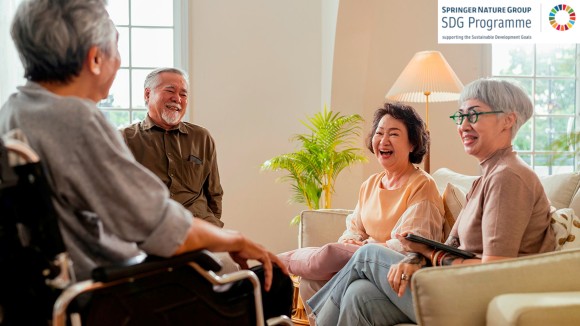Agnieszka Cieśla, PhD, Warsaw University of Technology, Poland

Agnieszka Cieśla, PhD, is an architect, urban planner, and lecturer at the Department of Spatial Planning and Environmental Sciences, Faculty of Geodesy and Cartography, Warsaw University of Technology. She is also a social activist and founder of the “Despite the age” foundation. She specialises in issues related to demographic ageing and its spatial consequences. Her area of particular interest is housing, both from a planning and policy perspective.
Delali A. Dovie, PhD, University of Ghana, Ghana
 Delali A. Dovie is a sociologist at the Centre for Ageing Studies at the University of Ghana, Legon, Accra Ghana. Her research addresses retirement planning, the nexus between labour issues and retirement planning, informal sector work dynamics, active ageing, urban ageing, social care, well-being and quality of life of older adults. To date, she has published a total of 24 journal papers, 8 book chapters. She is a member of the Ghana Sociological and Anthropological Association. She is also a member of the Association of Anthropology, Gerontology and Later Life Course.
Delali A. Dovie is a sociologist at the Centre for Ageing Studies at the University of Ghana, Legon, Accra Ghana. Her research addresses retirement planning, the nexus between labour issues and retirement planning, informal sector work dynamics, active ageing, urban ageing, social care, well-being and quality of life of older adults. To date, she has published a total of 24 journal papers, 8 book chapters. She is a member of the Ghana Sociological and Anthropological Association. She is also a member of the Association of Anthropology, Gerontology and Later Life Course.
Jorge Felix, PhD, University of Sao Paolo, Brazil
 Jorge Felix has a Ph.D in Social Sciences and M.Sc in Political Economy from the Pontifical Catholic University of São Paulo. He was a Professor at the University of São Paulo teaching the Bachelor's degree in Gerontology (2019-2023) and currently works teaching graduate studies (master’s degree) in Gerontology, in addition to being a postdoctoral researcher at Unicamp with a scholarship from FAPESP. He is interested in the following topics: longevity economics, care economics, financialization of old age (debtedness of old age) and work for the elderly.
Jorge Felix has a Ph.D in Social Sciences and M.Sc in Political Economy from the Pontifical Catholic University of São Paulo. He was a Professor at the University of São Paulo teaching the Bachelor's degree in Gerontology (2019-2023) and currently works teaching graduate studies (master’s degree) in Gerontology, in addition to being a postdoctoral researcher at Unicamp with a scholarship from FAPESP. He is interested in the following topics: longevity economics, care economics, financialization of old age (debtedness of old age) and work for the elderly.
Andrzej Klimczuk, PhD, SGH Warsaw School of Economics, Poland
 Andrzej Klimczuk, PhD, a sociologist and public policy expert, is assistant professor in the Department of Social Policy of the Collegium of Socio-Economics at the SGH Warsaw School of Economics, Poland. He worked as the external expert of institutions such as the European Commission, Interreg CENTRAL EUROPE Programme, and Fondazione Cariplo. He is a prolific author of many scientific papers in the fields of gerontology, labor economics, public management, and social policy.
Andrzej Klimczuk, PhD, a sociologist and public policy expert, is assistant professor in the Department of Social Policy of the Collegium of Socio-Economics at the SGH Warsaw School of Economics, Poland. He worked as the external expert of institutions such as the European Commission, Interreg CENTRAL EUROPE Programme, and Fondazione Cariplo. He is a prolific author of many scientific papers in the fields of gerontology, labor economics, public management, and social policy.
Vitalii S. Nitsenko, PhD, Ivano-Frankivsk National Technical Oil and Gas University, Ukraine
 Vitalii S. Nitsenko is a Professor at the Department of Entrepreneurship and Marketing at Ivano-Frankivsk National Technical Oil and Gas University. The Department of Entrepreneurship and Marketing actively participates in the scientific life of the University; the students have repeatedly occupied high positions in educational and scientific competitions and programs, including under the mentorship of Professor Nitsenko. He is the head of the Examination Commission for a comprehensive State examination and defense of Bachelor's and Master's Degree theses. Professor Nitsenko has many years of experience in scientific work and cooperation on agribusiness issues. His research interests include: Socio-Economic Analysis; Socio-Economic Development; Econometric Modelling; Business Models; Entrepreneurship; Sustainability; Environmental Sustainability; and Sustainable Development.
Vitalii S. Nitsenko is a Professor at the Department of Entrepreneurship and Marketing at Ivano-Frankivsk National Technical Oil and Gas University. The Department of Entrepreneurship and Marketing actively participates in the scientific life of the University; the students have repeatedly occupied high positions in educational and scientific competitions and programs, including under the mentorship of Professor Nitsenko. He is the head of the Examination Commission for a comprehensive State examination and defense of Bachelor's and Master's Degree theses. Professor Nitsenko has many years of experience in scientific work and cooperation on agribusiness issues. His research interests include: Socio-Economic Analysis; Socio-Economic Development; Econometric Modelling; Business Models; Entrepreneurship; Sustainability; Environmental Sustainability; and Sustainable Development.
Prospective authors may contact the Guest Editors via email:

